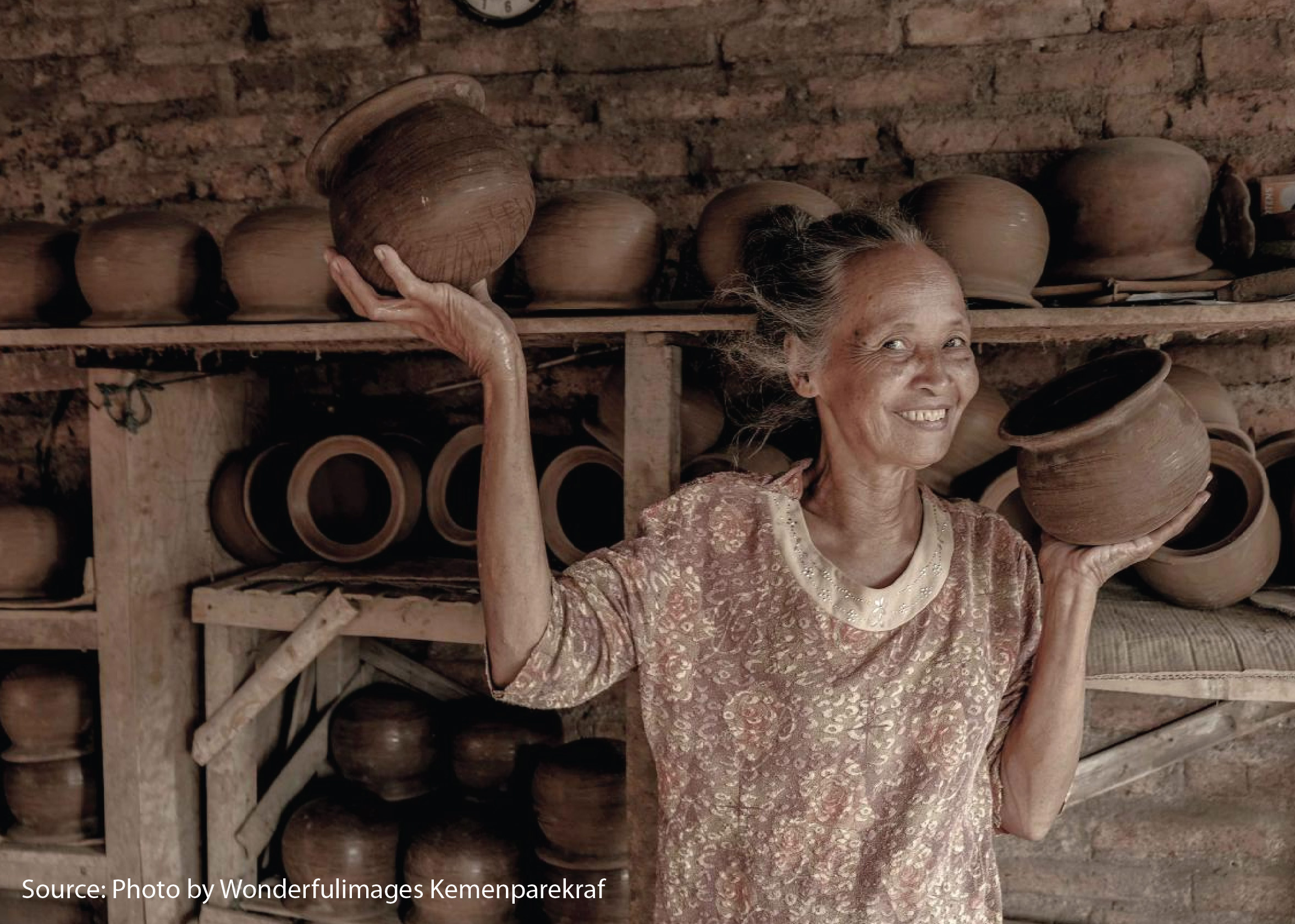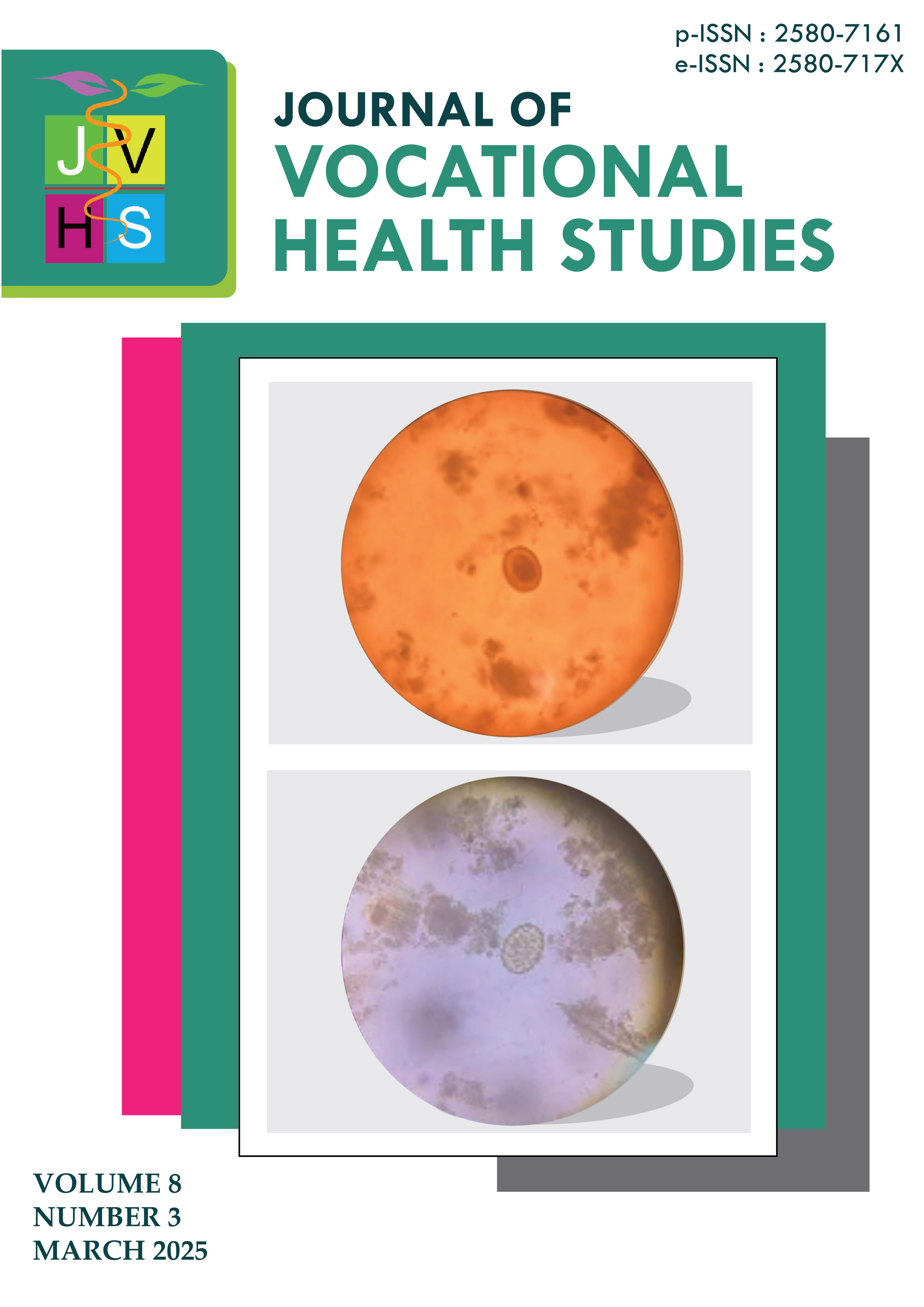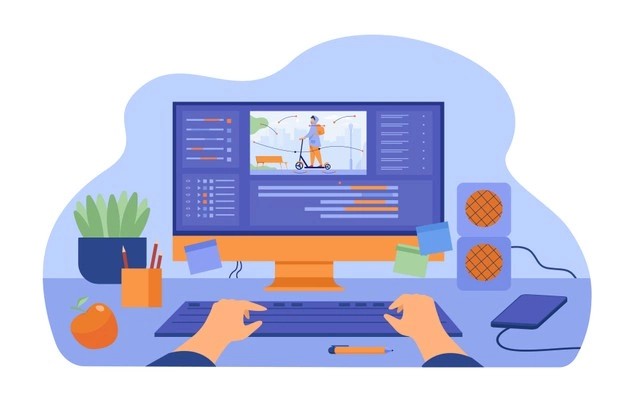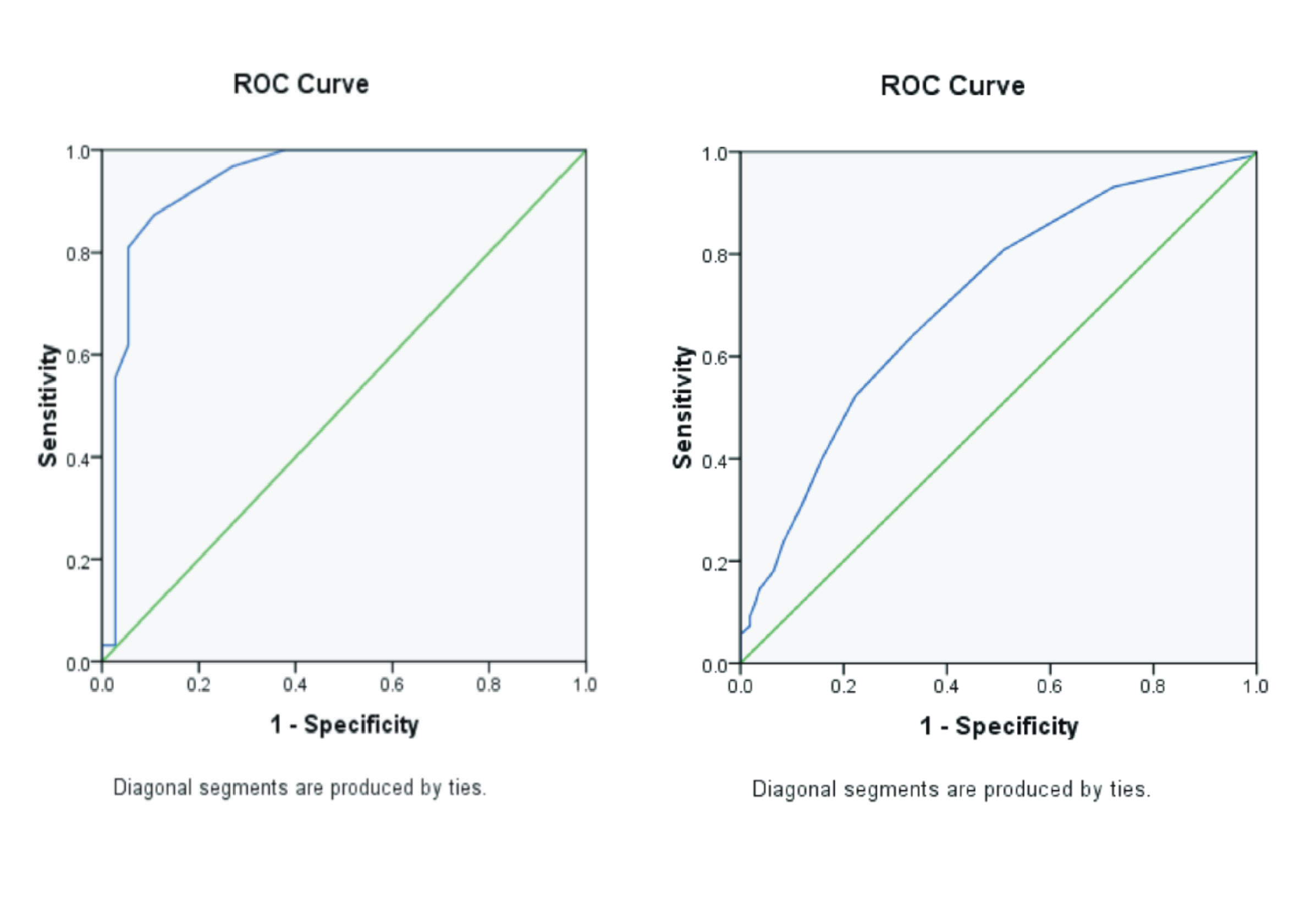THE ROLE OF INDIVIDUAL CHARACTERISTICS, PSYCHOSOCIAL ENVIRONMENTS, WORK FATIGUE, AND CALORIC ADEQUACY IN PERFORMANCE AMONG FEMALE POTTERY ARTISANS IN KARANGANYAR, BOROBUDUR

Downloads
Background: Pottery making is a vital tourism-supporting industry in Karanganyar, Borobudur, predominantly operated by female workers. Purpose: Investigate the factors influencing the performance of female pottery workers in Karanganyar. Method: A cross-sectional approach was employed and respondents were selected using simple random sampling techniques, yielding 43 participants out of 70 female workers. Data were collected using questionnaires and measurement devices (reaction timer, stature meter, and digital weight scale), then analyzed using Chi-square. Variables such as performance, psychosocial environment in the workplace, individual characteristics (age, marital status, number of children, and length of service), fatigue, and calorie adequacy were measured. The Copenhagen Psychosocial Questionnaire (COPSOQ) and the Individual Work Performance Questionnaire (IWPQ) were employed to assess psychosocial environments and performance, respectively. Result: The majority of pottery workers were 41 - 50 years old (32.56%), were married (93.02%), had 1 - 2 children (46.51%), and had more than 30 years of services (46.51%). Calorie deficits affected 41.86% workers, with 62.79% showing moderate performance, 81.40% experiencing a moderate psychosocial environment, and 48.84% facing mild fatigue. The Chi-square test revealed a significant association between age (p-value = 0.023), fatigue (p-value = 0.033), psychosocial environment (p-value = 0.022), and calorie adequacy (p-value = 0.047) toward performance. Conclusion: The findings highlight the importance of age, psychosocial environments, work fatigue, and calorie intake on the performance of female pottery workers.
Andarini, Y.D., Prasetya, T.A.E., 2017. The Correlation of Occupational Stress with Subjective Fatigue Women Workers in Weaving Loom Unit PT. X. Journal of Vocational Health Studies Vol. 1(1), Pp. 18-22.
Anita, R., Abdillah, M., Wu, W., Sapthiarsyah, M., Sari, R., 2020. Married Female Employees’ Work-Life Balance and Job Performance: The Role of Affective Commitment. Pertanika Journal of Social Science and Humanities Vol. 28(3), Pp. 1787–1806.
Arias-de la Torre, J., Artazcoz, L., Molina, A.J., Fernández-Villa, T., Martín, V., 2016. Inequalities in Mental Health in The Working Population of Spain: A National Health Survey-Based Study. Gaceta Sanitaria Vol. 30(5), Pp. 339-344.
Arsanti, S.M., Farapti, F., Rachmah, Q., 2023. Relationship between Adequacy Level of Nutritional Intake, Hydration Status, and Work Fatigue with Employee Productivity of PT. PAL Indonesia (Persero). Media Gizi Indonesia Vol. 18(1), Pp. 28-37.
Atiqoh, J., Wahyuni, I., Lestantyo, D., 2014. Faktor-Faktor yang Berhubungan dengan Kelelahan Kerja pada Pekerja Konveksi Bagian Penjahitan di CV. Aneka Garment Gunung Pati Semarang. Jurnal Kesehatan Masyarakat Vol. 2(2), Pp. 119-126.
Berthelsen, H., Hakanen, J.J., Westerlund, H., 2018. Copenhagen Psychosocial Questionnaire - A Validation Study using The Job Demand-Resources Model. Plos One Vol. 13(4), Pp. e0196450.
Cicognani, E., Albanesi, C., Valletta, L., Prati, G., 2020. Quality of Collaboration within Health Promotion Partnerships: Impact on Sense of Community, Empowerment, and Perceived Projects’ Outcomes’. Journal of Community Psychology Vol. 48(2), Pp. 323-336.
Dirgayudha, D., 2014. Faktor-Faktor yang Berpengaruh terhadap Kelelahan Kerja pada Pembuat Tahu di Wilayah Kecamatan Ciputat dan Ciputat Timur Tahun 2014 (Skripsi). Universitas Islam Negeri Syarif Hidayatullah, Program Studi Kesehatan Masyarakat Fakultas Kedokteran dan Ilmu Kesehatan.
Gimeno Ruiz de Porras, D., Rojas Garbanzo, M., Aragón, A., Carmenate-Milián, L., Benavides, F.G., 2017. Effect of Informal Employment on The Relationship between Psychosocial Work Risk Factors and Musculoskeletal Pain in Central American Workers. Occupational and Environmental Medicine Vol. 74(9), Pp. 645-651.
Hamouche, S., Parent-Lamarche, A., 2022. ‘Teleworkers’ Job Performance: A Study Examining The Role of Age as An Important Diversity Component of Companies. Journal of Organizational Effectiveness: People and Performance Vol. 10(2), Pp. 293-311.
Harris, K., Krygsman, S., Waschenko, J., Laliberte Rudman, D., 2018. Ageism and The Older Worker: A Scoping Review. Gerontologist 58(2), Pp. e1-e14.
Kartasapoetra, G.; M., 2003. Ilmu Gizi : Korelasi Gizi, Kesehatan dan Produktivitas Kerja. Rineka Cipta, Jakarta.
Koopmans, L., Bernaards, C., Hildebrandt, V., Buuren, S., van der Beek, A., De Vet, H., 2014. Improving The Individual Work Performance Questionnaire using Rasch Analysis. Journal of Applied Measurement Vol. 15(2), Pp. 160-75.
Kuwabara, A., Ogawa-Shimokawa, Y., Tanaka, K., 2011. Body Weight Divided by Squared Knee Height as An Alternative to Body Mass Index. Medical Hypotheses Vol. 76(3), Pp. 336-338.
Lim, J., Kwok, K., 2016. The Effects of Varying Break Length on Attention and Time on Task. Human Factors Vol. 58(3), Pp. 472-481.
Maes, L., Van Cauwenberghe, E., Van Lippevelde, W., Spittaels, H., De Pauw, E., Oppert, J.-M., Van Lenthe, F.J., Brug, J., De Bourdeaudhuij, I., 2012. Effectiveness of Workplace Interventions in Europe Promoting Healthy Eating: A Systematic Review. European Journal of Public Health Vol. 22(5), Pp. 677-683.
Maulida, D., Silaban, G., Salmah, U., 2023. The Effect of Physical Workload on Work Fatigue of Expedition Courier in Banda Aceh. International Journal of Health, Education & Social (IJHES) Vol. 6(6), Pp. 76-87.
Mayangsari, L., Restianti, T., Saputra, J., Rahadi, R.A., 2020. The Relationship between Self Employed Motivation and Individual Work Performance among Online Drivers in West Java, Indonesia. International Journal of Innovation, Creativity and Change Vol. 13(3), Pp. 513-530.
Meyers, A.L., Woodbury, M.P., Nelson, R.A., 2020. Orthopedic Manifestations of Lead Toxicity. Orthopedics Vol. 43(4), Pp. e202-e207.
Montero-Moraga, J.M., Benavides, F.G., Lopez-Ruiz, M., 2020. Association between Informal Employment and Health Status and The Role of The Working Conditions in Spain. International Journal of Health Services: Planning, Administration, Evaluation Vol. 50(2), Pp. 199-208.
Muis, M., Nai’em, M.F., Arsin, A.A., Darwis, A.M., Thamrin, Y., Hans, N.A.P., 2021. The Effect of Multiple Role Conflicts and Work Stress on The Work Performance of Female Employees. Gaceta Sanitaria, The 1st International Conference on Safety and Public Health Vol. 35(Suppl. 1), Pp. S90-S93.
Nag, A., Vyas, H., Nag, P., 2016. Occupational Health Scenario of Indian Informal Sector. Industrial Health Vol. 54(4), Pp. 377-385.
Narpati, J.R., Ekawati, E., Wahyuni, I., 2019. Hubungan Beban Kerja Fisik, Frekuensi Olahraga, Lama Tidur, Waktu Istirahat dan Waktu Kerja dengan Kelelahan Kerja (Studi kasus pada pekerja Laundry Bagian Produksi di CV.X Tembalang, Semarang). Jurnal Kesehatan Masyarakat Vol. 7(1), Pp. 337-344.
Nishisaka, M.M., Zorn, S.P., Kristo, A.S., Sikalidis, A.K., Reaves, S.K., 2022. Assessing Dietary Nutrient Adequacy and the Effect of Season-Long Training on Body Composition and Metabolic Rate in Collegiate Male Basketball Players. Sports (Basel) Vol. 10(9), Pp. 127.
Novanda, A.W., 2014. Hubungan Pemenuhan Kebutuhan Kalori Kerja dengan Produktivitas di Pabrik Sepatu (Skripsi). Fakultas Kesehatan Masyarakat, Universitas Airlangga, Surabaya.
Novanda, A.W., Dwiyanti, E., 2014. Hubungan Pemenuhan Kebutuhan Kalori Kerja dengan Produktivitas di Pabrik Sepatu. The Indonesian Journal of Occupational Safety and Health Vol. 3(2), Pp. 117–127
Rahmawati, Y.D., Khasanah, L., Wahyani, A.D., 2023. Hubungan Asupan Kalori, Kebiasaan Sarapan dan Status Gizi dengan Produktivitas Kerja Karyawan Universitas Muhadi Setiabudi | Jurnal Ilmiah Gizi Kesehatan (JIGK). Jurnal Ilmiah Gizi Kesehatan (JIGK) Vol. 4(2), Pp. 20-25.
Ramadhanti, A.A., 2020. Status Gizi dan Kelelahan terhadap Produktivitas Kerja. Jurnal Ilmiah Kesehatan Sandi Husada Vol. 9(1), Pp. 213-218.
Ramos-Villagrasa, P.J., Barrada, J.R., Río, E., Koopmans, L., 2019. Assessing Job Performance using Brief Self-report Scales: The Case of The Individual Work Performance Questionnaire. Revista de Psicología del Trabajo y de las Organizaciones Vol. 35(3), Pp. 195-205.
Sadeghniiat-Haghighi, K., Yazdi, Z., 2015. Fatigue Management in The Workplace. Industrial Psychiatry Journal Vol. 24(1), Pp. 12-17.
Sagherian, K., Clinton, M.E., Abu-Saad Huijer, H., Geiger-Brown, J., 2017. Fatigue, Work Schedules, and Perceived Performance in Bedside Care Nurses. Workplace Health & Safety Vol. 65(7), Pp. 304-312.
Şahin, S., Arıcı Özcan, N., Arslan Babal, R., 2020. The Mediating Role of Thriving: Mindfulness and Contextual Performance among Turkish Nurses. Journal of Nursing Management Vol. 28(1), Pp. 175-184.
Toscano, F., Zappalà, S., 2020. Social Isolation and Stress as Predictors of Productivity Perception and Remote Work Satisfaction during The COVID-19 Pandemic: The Role of Concern about The Virus in A Moderated Double Mediation. Sustainability Vol. 12(23), Pp. 9804.
Tucker, P., Folkard, S., 2012. Working Time, Health, and Safety: A Research Synthesis Paper (Working Paper).
Van der Lippe, T., Lippényi, Z., 2020. Co-Workers Working from Home and Individual and Team Performance. New Technology, Work and Employment Vol. 35(1), Pp. 60-79.
Wardana, R.K., Widyastuti, N., Pramono, A., 2018. Hubungan Asupan Zat Gizi Makro dan Status Gizi Ibu Menyusui dengan Kandungan Zat Gizi Makro pada Air Susu Ibu (ASI) di Kelurahan Bandarharjo Semarang. Journal of Nutrition College Vol. 7(3), Pp. 107-113.
Widyastuti, T., Hidayat, R., 2018. Adaptation of Individual Work Performance Questionnaire (IWPQ) into Bahasa Indonesia. International Journal of Research Studies in Psychology Vol. 7(2), Pp. 101-112.
Wolfe, M.T., Patel, P.C., 2019. Labor of Love? The Influence of Work-Conditions among Self-Employed and Work Stress. Journal of Business Venturing Insights Vol. 11, Pp. e00118.
Zalejska-Fiolka, J., Birková, A., Wielkoszyński, T., Hubková, B., Szlachta, B., Fiolka, R., Błaszczyk, U., Kuzan, A., Gamian, A., Mareková, M., Toborek, M., 2022. Loss of Skeletal Muscle Mass and Intracellular Water as Undesired Outcomes of Weight Reduction in Obese Hyperglycemic Women: A Short-Term Longitudinal Study. International Journal of Environmental Research and Public Health Vol. 19(2), Pp. 1001.
Copyright (c) 2025 Journal of Vocational Health Studies

This work is licensed under a Creative Commons Attribution-NonCommercial-ShareAlike 4.0 International License.
- The authors agree to transfer the transfer copyright of the article to the Journal of Vocational Health Studies (JVHS) effective if and when the paper is accepted for publication.
- Legal formal aspect of journal publication accessibility refers to Creative Commons Attribution-NonCommercial-ShareAlike (CC BY-NC-SA), implies that publication can be used for non-commercial purposes in its original form.
- Every publications (printed/electronic) are open access for educational purposes, research, and library. Other that the aims mentioned above, editorial board is not responsible for copyright violation.
Journal of Vocational Health Studies is licensed under a Creative Commons Attribution-NonCommercial-ShareAlike 4.0 International License




















































